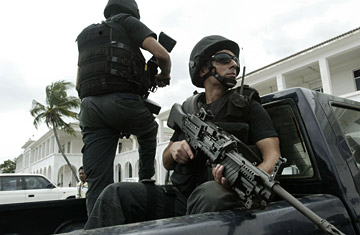
U.N. police outside the office of East Timor Prime Minister Xanana Gusmão in Dili after rebels attacked the house of President José Ramos-Horta, February 11, 2008.
Even a Nobel Peace Prize can't ward off bloodshed in East Timor. President José Ramos-Horta won the award in 1996 for his tireless efforts to free his nation from a repressive occupation by Indonesia, and ever since has commanded respect both internationally and from a majority of his people. But his legacy of peace was shattered on Monday morning, when renegade East Timorese soldiers attacked his home on the outskirts of the capital, Dili, shooting Ramos-Horta at least twice in the torso. The East Timorese president was airlifted to Darwin, Australia, where hospital staff have characterized his situation as serious but stable. The leader of the rebel soldiers, Alfredo Reinado, was killed in a shoot-out with presidential security guards, according to an army spokesman. The spokesman confirmed that shots had also been fired at a car carrying Prime Minister Xanana Gusmão, but that he had escaped unscathed.
Three decades ago, while some of his compatriots waged a fierce independence struggle from the jungles of East Timor, Ramos-Horta took a less violent path. The now-58-year-old, who earned a Peace Studies degree at Antioch University in the U.S., tirelessly criss-crossed the globe, campaigning for an end to Indonesia's brutal annexation of his homeland. His passionate diplomacy eventually paid off. Six years after Ramos-Horta shared the Nobel Peace Prize with East Timorese Bishop Carlos Filipe Ximenes Belo, East Timor finally won full independence from Indonesia, ending a traumatic occupation during which up to 200,000 East Timorese are believed to have perished. (Hundreds more died as Indonesian troops withdrew in 1999.)
Asia's youngest nation — and one of the region's poorest — has been on edge since the spring of 2006, when hundreds of army troops, predominantly from the country's west were sacked. In protest, army commander Reinado deserted, fashioning himself as leader of a rebel corps. The military dispute sparked a factional civilian conflict between the country's Easterners and Westerners — groups that until then had rarely even defined themselves along regional lines. Dozens died in the ensuing mob violence. An estimated 150,000 of the nation's 1 million citizens were forced to flee their homes. Reinado was briefly jailed but escaped from prison and since then he and many of his forces have remained on the run, engaging in occasional firefights with Australian led-peacekeepers, whose East Timor mission continues six years after the country's independence.
Although the nation's first post-independence presidential elections proceeded largely peacefully in May 2007, the continuing presence of outlaw soldiers has marred the storyline of a successful young democracy. Gang warfare by groups loosely affiliated with pro- and anti-Reinado forces have only added to the sense of anarchy. Reinado was due to be tried in absentia for his role in the 2006 violence, but the court case would have had little effect given that the former army commander was still on the run. "Even after the elections, we felt like we were waiting for something bad to happen," says Marcelino Magno, chief of staff for Fernando de Araujo, East Timor's speaker of parliament. "There was a lot of tension building up."
Ramos-Horta himself professed not to be overly concerned about the occasional bloodshed. "Nation-building is a slow, laborious process," he told TIME last year. "It will take time, effort and lots of work." As for Reinado and his men, the President at the time dismissed them as "troublesome flies, who will not deter us from the task of nation-building."
Although the streets of Dili remained calm in the immediate hours after the attack, groups of youth loyal to Reinado vowed to gather for an anti-government rally. A government spokesman said forces were being mobilized to deal with the angry Reinado supporters. But for the people of East Timor, who know just how quickly low-level violence can escalate into widespread bloodshed, Monday was a day to stay inside. Many offices were shuttered, and NGOs warned their staff to stay home. "I don't dare go out," says one East Timorese, who works for the United Nations. "If even the President can get shot, what's the guarantee of safety for normal people like me?"
